

Should Engineers Get a PHD? 11 Truths!
Should engineers get a PhD? Depends on what you want to achieve in your career. There are ups and downs to pursuing a PhD in engineering.
To figure it out, start by asking yourself what kind of career you’re after. Your decision will be based on factors like:
- Your interests
- How much money you want to make
- The lifestyle you desire
- Your other career options
We’ll chat about these four pointers, and then dive headfirst into 11 extra tips to help you size up the pros and cons of pursuing a PhD in engineering.

Important Note: I’ll be generalizing each factor I discuss, so keep in mind that there are always exceptions. And don’t forget that some superstar engineers will fly high whether they have a PhD or not. Success can come either way!
What really interests you in engineering?
A PhD can give you a leg up when tackling groundbreaking technological challenges. Without one, you might find it tough to access such work. But if you’re into more typical engineering gigs in the industry, then a PhD won’t be worth the time and money.
Usually, people go for a PhD if they want to become a specialist or researcher, or if they have their sights set on an academic career. A PhD can provide flexibility between industry and academia, letting you explore fresh ideas and spearhead innovative projects.
Here’s my two cents on both academia and industry:
In academia
In this world, your work might not make an immediate real-world splash. It could take years or even decades for your research to be recognized and applied. So, if you’re looking to become an overnight sensation, you might want to think again.
But you know what? To a select few who are passionate about your field, your work will be a big deal. You’ll have the chance to share your unique ideas with like-minded folks and make a difference in your little corner of the world.
And never forget that every small step you take will ultimately contribute to the greater good of humanity.
In industry
Meanwhile, in the industry, your work can make an instant impact. You’ll tackle awesome projects that are directly tied to a company’s goals, making a real difference in people’s lives.
Take, for example, working on R&D for batteries. Batteries are essential for our future, and every tiny improvement can change our lives in a big way.
The downside? Your company might not give you the credit you deserve for your groundbreaking work. But don’t sweat it – there are loads of similar opportunities for PhD holders who are motivated and inventive.
All in all, whether you pick academia or industry, you’ll have plenty of chances to change the world. Just keep cranking out top-notch work, and everything else will fall into place.
How much money do you want to make?
First off, don’t pay for your PhD yourself. If you can’t get funding, it means the market doesn’t see the value in your research.
Even with funding, you might only make $20k to $40k a year, depending on your university. If you’d gone straight into the industry, you could be pocketing $150k or more each year. Then you could invest that salary in real estate, businesses, you name it.
So, if money’s your main concern, you’ll lag behind your peers who jumped straight into the industry. Because while you’re spending 3 to 5 years earning a PhD and living on ramen noodles, they’ll be making bank.
And if you’re thinking about academia after your PhD, buckle up for even more financial hurdles.
Let’s be real: a PhD is a massive investment of time and money. If dollar signs are all you see, don’t bother with a PhD.
Important Note: Engineers with PhDs who start multi-million dollar businesses are exceptions, just like college dropouts who start multi-billion dollar businesses.
PhD stipends from major U.S. universities
Check this shortlist of engineering department stipends from major universities, put together by PhD Stipends :
As you can tell, diving into a PhD in engineering might not make you rich overnight. But, hey, it does give you the chance to work on some mind-blowing research and help shape the world of tomorrow.
Important Note: Don’t forget to weigh in the cost of living when you’re checking out those PhD stipends. Higher stipends usually come with a heftier price tag on everyday life, like in the Bay Area where Stanford is nestled.
What type of lifestyle do you want?
Dreaming of a chill, easygoing life? Academia might not be your jam. You could grind away for years and never snag that elusive academic tenure. Even in the industry, you might land just an ordinary engineering gig, making your PhD feel like a waste.
The professional stress from this uncertain journey can seep into your personal life. Financial struggles might become your constant companion, impacting every corner of your life. But hey, with a PhD, you get the keys to the world’s coolest toys and can work in top-notch national labs and fancy universities.
If you’re down to embrace uncertainty into your golden years, a PhD could be worth the ride. You may trade short-term comfort for the shot at doing what sets your soul on fire in the long run.
Mind you, I use the term sacrifice lightly. If you’re head over heels for your research, nothing else will even matter.
Do you have other options in life?
If you’re still feeling the PhD vibe after all this, ask yourself:
- Do you have any other career options?
- Is there another gig that’s tugging at your heartstrings?
If you said yes to either, hold your horses! Give some serious thought to whether a PhD is really your destiny. I’ve got friends who ditched their PhD programs to start businesses, and now they’re swimming in millions!
On the flip side, I know folks who chased a PhD just to immigrate to the US for a better life. But listen, don’t just follow the crowd. Committing to a PhD is a massive deal and can change your life in a big way.
This is further highlighted by the low number of U.S. students going for a PhD in engineering each year. The data below, from ASEE , includes all engineering fields combined.
Important Note: The number of awarded engineering doctorate degrees is increasing. But the U.S. population is also increasing, and more foreign students are immigrating to the U.S. to pursue a PhD.
11 Pointers to consider in pursuing a PhD in engineering
Now, here are 11 pointers I’ve gathered from my pals and relatives who’ve gone down the PhD-in-engineering rabbit hole:
#1 Choose a research topic with real-world oomph
Picking the perfect research topic is the key to unlocking your PhD’s potential. Focus on fields that are shining bright, like:
- Artificial Intelligence (AI)
- Renewable energy
These areas tend to reel in more funding and have a higher demand in both academia and industry. After all, you still gotta pay the bills and keep a roof over your head.
#2 A PhD hones your thinking skills, not just your specialization
In the real world, you might not use all that fancy research know-how from your PhD. Instead, you’ll rely on your shiny new way of thinking to tackle problems.
So, a PhD isn’t just about becoming the go-to person in a super-niche field. It’s also about learning how to think and tackle the tough stuff.
And, hey, you can pick up these skills outside the hallowed halls of academia too.
#3 Don’t expect a PhD to put you on a pedestal
Sure, a PhD might make some folks go “ooh” and “aah,” but at the end of the day, it’s all about delivering the goods. Your skills and passion for the job are what really count, not the alphabet soup trailing your name.
I’m all about treating everyone equally, regardless of their academic fanfare.
Of course, a PhD can give you a credibility boost when making first impressions. But remember, it’s what you do next that really matters.
#4 A PhD can open doors, but it might close some too
A PhD can help you score high-level gigs at big-shot companies with in-house research and development. But beware – it might also slam some doors shut if you’re deemed overqualified for certain roles.
Choose your career path wisely and take time to think through your future pragmatically.
#5 Dive into a PhD in a subject that ignites your passion
Being passionate about your subject is the secret sauce to staying motivated during your PhD journey. Surround yourself with amazing people who share your interests, or you’ll struggle through the tough times – and trust me, there’ll be plenty.
#6 Don’t chase a PhD for the wrong reasons
Don’t go after a PhD just because “it’s what smart people do” or because you want to add some extra letters to your name.
Let’s get real here: a PhD doesn’t magically transform you into a genius. Heck, some of the brightest minds out there never even set foot in a college classroom!
If you were a regular Joe or Jane before diving into a PhD program, chances are you’ll still be one when you’re done. But hey, you don’t need to be a mega-brainiac to tackle a PhD. If you can snag a spot in a program, you’ve definitely got what it takes to see it through.
#7 Fear not the PhD pursuit
Some folks are scared stiff of the grueling trek to PhD-land. It’s like climbing a never-ending mountain, right?
Well, anything worth chasing is gonna be tough. If it were a piece of cake, everybody and their dog would be doing it!
#8 A PhD isn’t for everyone
To nail that PhD, you need a killer work ethic and a fierce dedication to your field. That’s what’ll help you conquer those hurdles and push through the lonely stretches.
Let’s face it: the PhD life isn’t everyone’s cup of tea. Just look at the small number of doctorates awarded each year in the U.S., as reported by ASEE. The data below covers all engineering fields combined:
And if you’re bold enough to take on a PhD, you’re probably an ambitious go-getter. So you’ll no doubt find some other epic challenge to sink your teeth into.
#9 Pick your program and advisor like a pro
The right program and advisor can make or break your PhD ride.
Seriously, you’ll be bending over backward for your advisor for years. They’ve got the power to make your life a living nightmare. Keep your eyes peeled for these red flags:
A bad advisor:
- Is a grade-A jerk
- Makes everything about them
- Squeezes you for free labor and grinds you down
- Fills you with guilt and doubt
A good advisor:
- Is super nice and supportive
- Turns you into a top-notch researcher
- Dishes out awesome life advice
- Hooks you up with conferences and fellowships
- Lets you visit other labs
So do your homework and pick your program and advisor with care.
#10 Weigh the impact on your loved ones
I’ve known people who juggled family life and a PhD. Sure, it was a bumpy road, but they made it work.
Keep in mind that a PhD can take ages, and your biological clock won’t wait around for you to finish.
#11 Industry jobs for PhD grads
Dreaming of a PhD to score an industry job? From what I’ve seen, here are a couple of paths for PhD graduates:
- Work in well-funded government labs, doing the research thing.
- Join big-league companies like Google, Apple, or IBM that can afford to splash cash on research.
If that doesn’t float your boat, a Master’s degree might be all you need for other engineering gigs in the industry.
Important Note: During recessions, R&D departments usually hold steady. R&D is a long-haul investment for a company, after all.
If an R&D project kicks off during a slump, it’ll wrap up just as the economy bounces back. That way, the company comes out stronger on the other side.
“Should engineers get a PhD” wrap up
Deciding to pursue a PhD is a deeply personal choice that deserves some serious soul-searching.
Don’t let peer pressure sway you. Take a good, hard look at the pros and cons, and make the call that’s right for you.
Now, I’ve met engineers who’d never trade their PhD experience for the world. But others reckon it was the worst decision they ever made.
At the end of the day, a PhD is all about the journey, not just the fancy certificate and those three little letters you get to tack onto your name.
Do you think a PhD in engineering is worthwhile? Will it be even more valuable down the road?
SUBSCRIBE TO ENGINEER CALCS NEWSLETTER
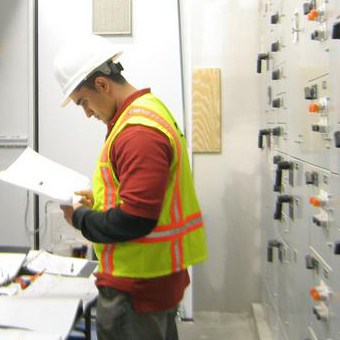
Author Bio: Koosha started Engineer Calcs in 2019 to help people better understand the engineering and construction industry, and to discuss various science and engineering-related topics to make people think. He has been working in the engineering and tech industry in California for well over 15 years now and is a licensed professional electrical engineer, and also has various entrepreneurial pursuits.
Koosha has an extensive background in the design and specification of electrical systems with areas of expertise including power generation, transmission, distribution, instrumentation and controls, and water distribution and pumping as well as alternative energy (wind, solar, geothermal, and storage).
Koosha is most interested in engineering innovations, the cosmos, sports, fitness, and our history and future.
6 thoughts on “Should Engineers Get a PHD? 11 Truths!”
The most insightful comparison I’ve found on this topic so far. Thank you.
Glad you found the article helpful 🙂
Thanks for that nicely summed up article – not too long and covers the important points on everybody’s mind! 🙂
Glad you enjoyed the read 🙂
Thank you, I have just been searching for info about this subject for ages and yours is the best I have found out till now. However, what in regards to the conclusion? Are you positive about the source?
I tried to capture all angles of the experience, so do your best to apply the lessons to your personality and reasons for pursuing the degree.
Leave a Comment Cancel reply
Save my name, email, and website in this browser for the next time I comment.

PhD Admissions
Earn your doctorate at duke.
Completing a PhD program in engineering is hard. Really hard. But after years of preparation, frustration and celebration, a Duke doctorate stands out from the crowd.
Between field-defining faculty and a web of industrial, entrepreneurial and public-policy connections, with a Duke Engineering PhD, you can just about go anywhere and do just about anything your heart desires.
And with Duke’s comprehensive financial and professional support, you won’t take that journey alone.

Duke: The Path to a High-Impact Career
Wherever your path leads you, a Duke PhD will ensure you’ll arrive prepared to make a difference.
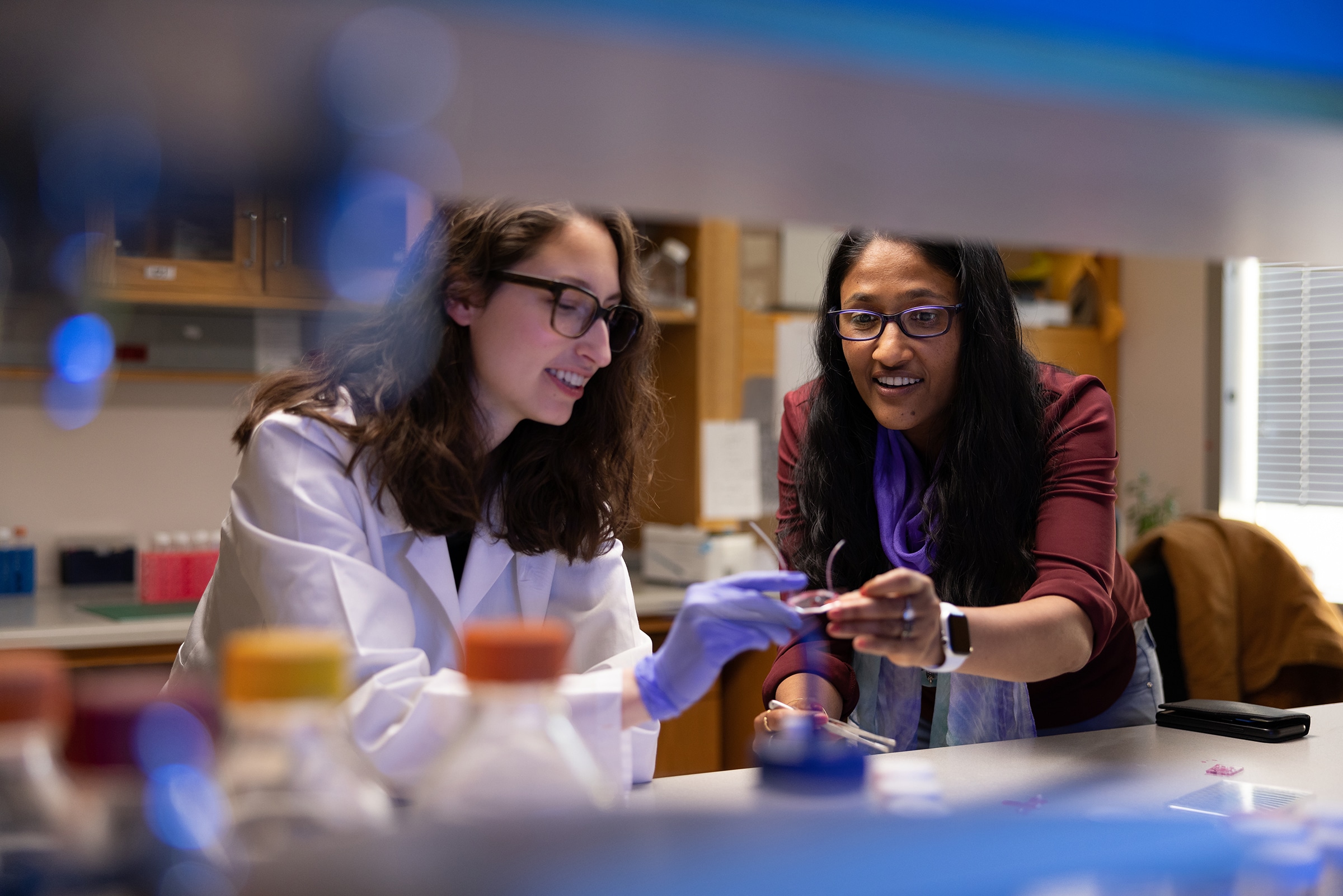
Biomedical Engineering
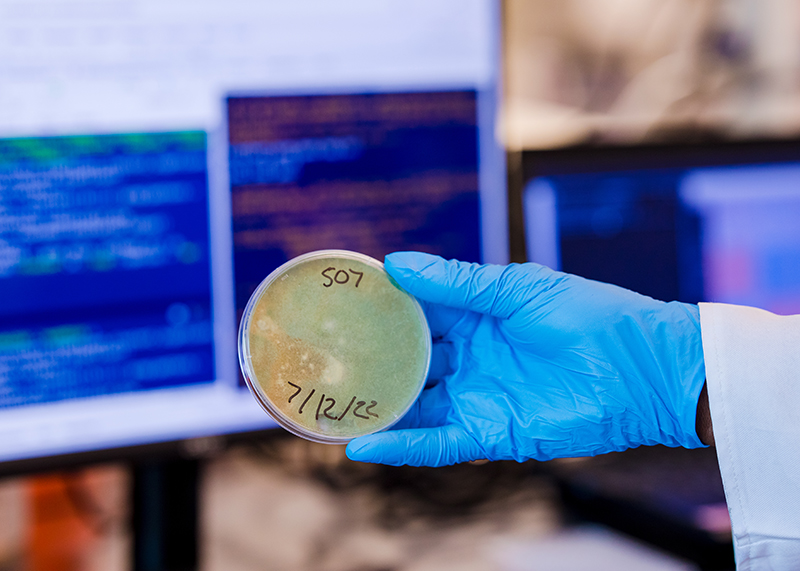
Civil & Environmental Engineering

Electrical & Computer Engineering

Mechanical Engineering & Materials Science
Guaranteed funding.
Duke provides significant financial support. And that’s just the beginning. There’s mentorship and career exploration support, too.
Generous Stipend
Guaranteed pay, 12 months a year, for the first five years
Paid Tuition
Covered by Duke during the first five years of study
For the first five years, Duke pays all mandatory fees
Insurance Coverage
For six years, Duke pays your health and dental premiums
Applying to Duke
Contact us at [email protected]
Join Our Mailing List
Receive updates, insights and invitations from our Admissions Team
Review Financial Support Package
5 years of stipend—plus six years of health and dental coverage
Find Your Deadline
See the application calendar for all Duke PhD programs
Start Your Application
Using Duke’s secure online platform

Diversity Makes Better Engineers
An optimist sees the glass as half full. A pessimist? Half empty. An engineer sees a glass that’s twice as big as it needs to be. Point is, engineers see things differently. Duke engineers see things very differently. Why use glass at all? Can we create a more efficient material? Ooh, should we include a water quality sensor? Here, we value different backgrounds and ways of thinking—because new approaches generate new solutions.
PhD students
Phd students per tenure-track faculty member, of our phd students received an nsf or other prestigious fellowship, in new research awards won in fy22, best graduate biomedical engineering program.
U.S. News & World Report
Lower cost of living in Durham vs. Boston
Facilities: welcome to wilkinson.
The newest of our buildings is 81,000 square feet of transformational design. Inside Wilkinson are research neighborhoods focused on advances in health, computing and the environment.
Dedicated workspaces for doctoral students feature natural light and campus views.
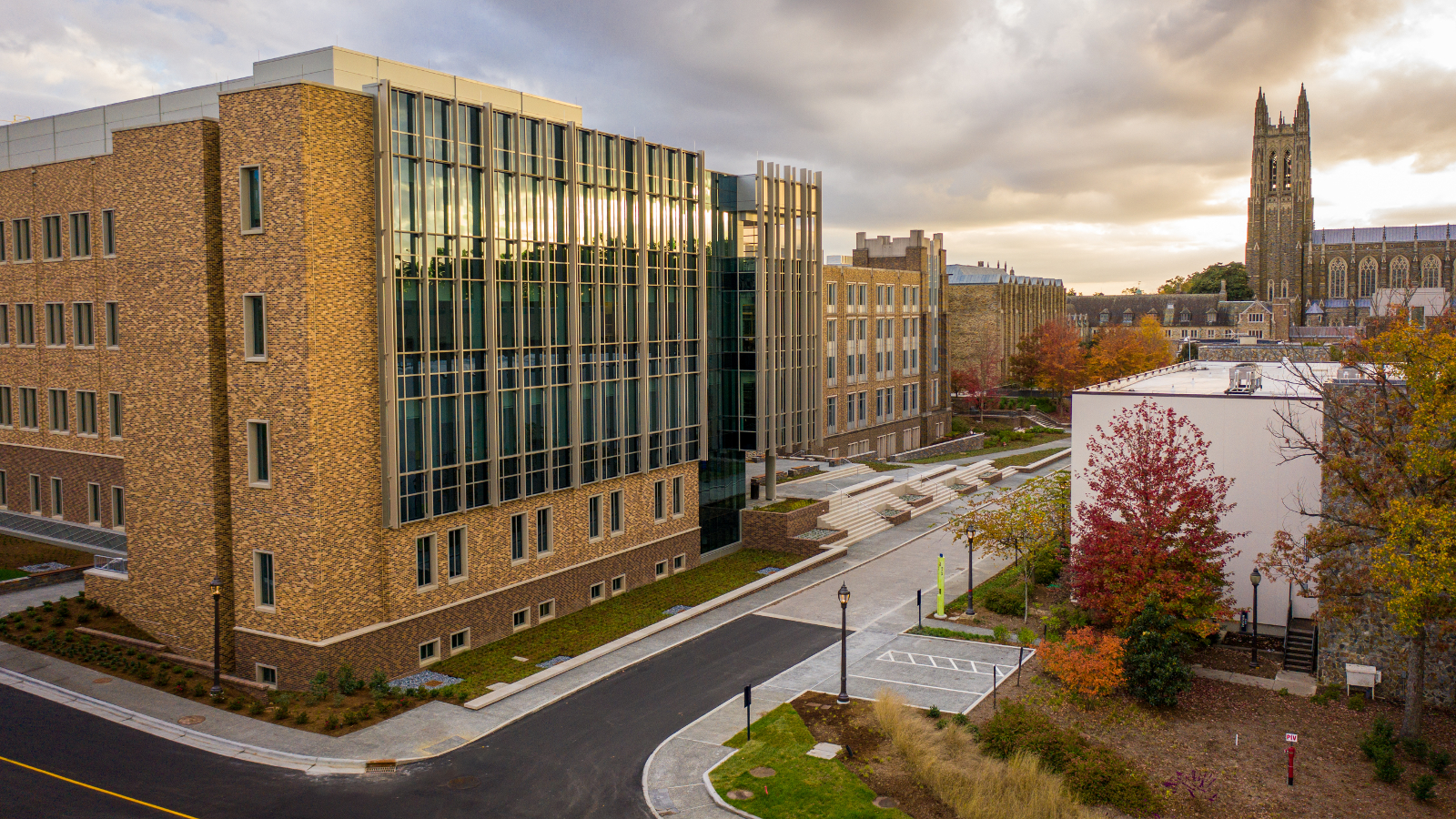
Durham and Beyond
Location. location. location..
At the north vertex of North Carolina’s famed Research Triangle, the city of Durham is essential to the Duke Engineering experience. Among our neighbors are hundreds of startups and standard bearers both private and public, a growing collection of James Beard Award-winning chefs, and a quickly growing community and skyline. River rafting, trail hiking, mountain climbing and sandy beaches are all just a couple hours’ drive away.
It doesn’t take an advanced degree to see why Durham is the #3 best place to live in America according to U.S. News and World Report, but come get one here anyway.

Interested in joining our community?
Start a conversation with Duke.
- Industry Partners
- Aerospace & Automotive
- AI, Machine Learning, IoT & Data Science
- Biotechnology & Healthcare
- Building, Design & Construction
- Business, Management & Consulting
- Cybersecurity
- Electrical & Electronics
- Energy & Sustainability
- Entrepreneurship & Startup
- Government & Non-Profit
- Manufacturing & Materials
- Research & Academia
- Biomedical Engineering
- Computer Science & Engineering
- Electrical & Systems Engineering
- Energy, Environmental & Chemical Engineering
- Mechanical Engineering & Materials Science
- Greater St. Louis Region
- Women & Engineering
- Multicultural
- Featured Jobs
Should You Get Your PhD in Engineering?
- Share This: Share Should You Get Your PhD in Engineering? on Facebook Share Should You Get Your PhD in Engineering? on LinkedIn Share Should You Get Your PhD in Engineering? on X
Is it worth it to continue the academic track towards an engineering PhD, or are you be better off going into the industry, paying back those student loans? The answer depends on what you want from your engineering career.
Do You Enjoy Research?
The greatest advantage of the PhD is that it gives you experience in carrying out detailed research. Your Master’s and Bachelor’s degrees are focused on learning things that are already known, but the PhD teaches you to find out new things, to carry out experiments, to report data, and learn from your mistakes.
Ideally, you become a subject matter expert in your chosen focus. That puts you in a great position for jobs that require that specific expertise, or where research skills are highly valued.
Preet Anand, CEO of technology company BlueLight , says that you need to think about what role you want. “A PhD is incredibly important for anyone involved with scientific innovation and research. However, if your aspirations are to be involved with implementation and quickly moving into the business side, a PhD is probably not effective from a time-ROI perspective. It’s especially not helpful if you’re working in software, where the speed of innovation in industry is quicker than the speed of academia.”
Forensic engineer Robert McElroy specializes in technical failure analysis related to automobiles, heavy trucks, and all types of industrial vehicles, and is an internationally recognized expert on the causes of industrial and transportation accidents. He stresses that his PhD has both commercial and technical benefits. “As a serial entrepreneur and forensic engineer, without the PhD, I could never have accomplished what I have been fortunate enough to achieve.”
An Engineering PhD Opens Doors…
Karen Thole, Department Head of Mechanical and Nuclear Engineering at Pennsylvania State University and member of the American Society of Mechanical Engineers , explains that the usefulness of PhDs in industry quite depends upon the industry itself. “Many high tech industries continue to develop “tools” to help their engineers determine better designs. The development of such tools generally requires a graduate level understanding. And, a company’s tools are what set apart the competition. For example, there are several companies that make gas turbine engines with the basic architecture being the same. What sets companies apart, however, are those that do their own tool development such as predictive codes, design codes, standard work practices, etc. As tools improve, it helps to advance technology and develop better engines. To improve the tools, however, it requires a high level of understanding of the physics, which is where PhDs come in. The more technologically advanced the company, the more it takes some sort of research center, which generally employs PhDs.”
“I have yet to find a jobless, homeless PhD in engineering.”
Naturally, this means that some industries have far more demand for PhDs than others. “The aerospace industries as well as the high tech electronics industries both look for PhDs,” says Thole. “They’re generally the ones which require ME and EE disciplines.”
David Gantshar, CEO of engineering recruiters Shepherd Search Group Inc. notes that the value of a PhD often depends on the character of the senior management. Companies founded or led by PhDs tend to have more respect for those who have been through the same academic training. “A PhD is highly valued in some circumstances and not necessary at other times,” he says. “For a vice president of engineering or another senior executive position, it can be a big plus, especially if the company president himself has a PhD. The PhD degree reflects intense and successful research and would be valued in an R&D environment. If the president of the organization has one, he/she will value those individuals that are “on par” academically and offer credentials similar to those around the table. However for a senior engineering or manager’s position, it is rarely required.”
… Unless It Closes Them
However, one problem faced by many PhDs is that they’re often regarded as “too academic,” and therefore not suited to the pace and pressures of commercial engineering.

Credit: NASA
Whether or not that’s true, it’s certainly a perception you have to battle with, as Gantshar notes. “It really depends on the organization. Some companies might see a Ph.D. as too research oriented and would identify the engineer as insufficiently hands-on. We have seen many instances where a PhD has actually worked against a candidate in these circumstances and the individual with less academic credentials is selected based upon these perceptions.”
What About Non-STEM PhDs?
If you’re thinking of going into the management role, then it may be worth considering a PhD which proves your business credentials. Combined with your engineering experience, it can give you a major advantage over other managers.
Sonja Fisher recently completed her PhD in business. “It has been very helpful,” she says, with evident pride. “I am getting opportunities left and right. I seem to be more in demand since getting my PhD.”
Should You Get Your PhD?
If you’re looking for a research role, a job requiring very specific expertise or a position in a company that’s known for innovation or R&D, then a PhD can pay great dividends. According to the latest Engineering Income and Salary Survey , on average, you’ll earn about 35% more than an engineer with a Bachelor’s degree – typically about $30,000 a year. That’s a huge payoff for those few years of research.
Equally importantly, a PhD will give you a level of job security that a lesser degree won’t give you. “I have yet to find a jobless, homeless PhD in engineering. That’s my simple answer,” grins Thole. Not only that, but it opens up new opportunities. “The PhD really allows you to tailor your own career a bit more. Generally companies want their PhDs to seek out new ideas and think bigger about the field. So, it presents more opportunities to do what you want.”
Source: Engineerjobs.com
- Undergraduate
- Postdoctoral Programs
- Future Engineers
- Professional Education
- Open Access
- Global Experiences
- Student Activities
- Leadership Development
- Graduate Student Fellowships
Aeronautics and Astronautics
Biological engineering, chemical engineering, civil and environmental engineering, electrical engineering and computer science, institute for medical engineering and science, materials science and engineering, mechanical engineering, nuclear science and engineering.
- Industry Collaborations
- Engineering in Action
- In The News
- Video Features
- Newsletter: The Infinite
- Ask an Engineer
- Facts and Figures
- Diversity, Equity & Inclusion
- Staff Spotlights
- Commencement 2023
We tackle problems — the harder, the better — and we generate solutions.
Graduate study is not for the faint-hearted, but the rewards match the risks. When it is your job to generate knowledge, you need to go where no one has gone before. And, we’ll give you what you need to get there.
From the day they step on campus, our grad students are not afraid to go after the hardest problems. Even the ones that might take a miracle (or two) to realize, like practical fusion and imaging black holes .
In the end, it is our students who show us where the most important problems are — and how to solve them.
But you don’t need to take our word for it. Our grad students revel in telling their stories — the amazing days, the challenging days, and of course, where to score free food.
https://engineering.mit.edu/wp-content/uploads/2016/10/square_AeroAstro.jpg

Shape the next century of flight.
https://engineering.mit.edu/wp-content/uploads/2016/12/square_BE.jpg
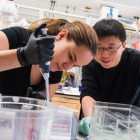
Crack the code of biology.
https://engineering.mit.edu/wp-content/uploads/2016/12/square_cheme.jpg

Put molecules into action.
https://engineering.mit.edu/wp-content/uploads/2016/12/square_CEE.jpg

Create smarter, better, faster infrastructures.
https://engineering.mit.edu/wp-content/uploads/2016/12/square_EECS.jpg

Design, invent, or hack digital technologies.
https://engineering.mit.edu/wp-content/uploads/square_imes2.jpg
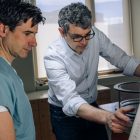
Go from the lab bench to the patient bedside.
https://engineering.mit.edu/wp-content/uploads/2016/12/square_DMSE.jpg
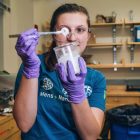
Redefine the material world.
https://engineering.mit.edu/wp-content/uploads/2016/12/square_meche.jpg

Be at the heart of the maker movement.
https://engineering.mit.edu/wp-content/uploads/2016/12/square_NSE.jpg

Advance nuclear technologies.
How Long Does It Take to Get a Ph.D. Degree?
Earning a Ph.D. from a U.S. grad school typically requires nearly six years, federal statistics show.
How Long It Takes to Get a Ph.D. Degree

Caiaimage | Tom Merton | Getty Images
A Ph.D. is most appropriate for someone who is a "lifelong learner."
Students who have excelled within a specific academic discipline and who have a strong interest in that field may choose to pursue a Ph.D. degree. However, Ph.D. degree-holders urge prospective students to think carefully about whether they truly want or need a doctoral degree, since Ph.D. programs last for multiple years.
According to the Survey of Earned Doctorates, a census of recent research doctorate recipients who earned their degree from U.S. institutions, the median amount of time it took individuals who received their doctorates in 2017 to complete their program was 5.8 years. However, there are many types of programs that typically take longer than six years to complete, such as humanities and arts doctorates, where the median time for individuals to earn their degree was 7.1 years, according to the survey.
Some Ph.D. candidates begin doctoral programs after they have already obtained master's degrees, which means the time spent in grad school is a combination of the time spent pursuing a master's and the years invested in a doctorate. In order to receive a Ph.D. degree, a student must produce and successfully defend an original academic dissertation, which must be approved by a dissertation committtee. Writing and defending a dissertation is so difficult that many Ph.D. students drop out of their Ph.D. programs having done most of the work necessary for degree without completing the dissertation component. These Ph.D. program dropouts often use the phrase " all but dissertation " or the abbreviation "ABD" on their resumes.
According to a comprehensive study of Ph.D. completion rates published by The Council of Graduate Schools in 2008, only 56.6% of people who begin Ph.D. programs earn Ph.D. degrees.
Ian Curtis, a founding partner with H&C Education, an educational and admissions consulting firm, who is pursuing a Ph.D. degree in French at Yale University , says there are several steps involved in the process of obtaining a Ph.D. Students typically need to fulfill course requirements and pass comprehensive exams, Curtis warns. "Once these obligations have been completed, how long it takes you to write your dissertation depends on who you are, how you work, what field you're in and what other responsibilities you have in life," he wrote in an email. Though some Ph.D. students can write a dissertation in a single year, that is rare, and the dissertation writing process may last for several years, Curtis says.
Curtis adds that the level of support a Ph.D. student receives from an academic advisor or faculty mentor can be a key factor in determining the length of time it takes to complete a Ph.D. program. "Before you decide to enroll at a specific program, you’ll want to meet your future advisor," Curtis advises. "Also, reach out to his or her current and former students to get a sense of what he or she is like to work with."
Curtis also notes that if there is a gap between the amount of time it takes to complete a Ph.D. and the amount of time a student's funding lasts, this can slow down the Ph.D. completion process. "Keep in mind that if you run out of funding at some point during your doctorate, you will need to find paid work, and this will leave you even less time to focus on writing your dissertation," he says. "If one of the programs you’re looking at has a record of significantly longer – or shorter – times to competition, this is good information to take into consideration."
He adds that prospective Ph.D. students who already have master's degrees in the field they intend to focus their Ph.D. on should investigate whether the courses they took in their master's program would count toward the requirements of a Ph.D. program. "You’ll want to discuss your particular situation with your program to see whether this will be possible, and how many credits you are likely to receive as the result of your master’s work," he says.
How to Write M.D.-Ph.D. Application Essays
Ilana Kowarski May 15, 2018

Emmanuel C. Nwaodua, who has a Ph.D. degree in geology, says some Ph.D. programs require candidates to publish a paper in a first-rate, peer-reviewed academic journal. "This could extend your stay by a couple of years," he warns.
Pierre Huguet, the CEO and co-founder of H&C Education, says prospective Ph.D. students should be aware that a Ph.D. is designed to prepare a person for a career as a scholar. "Most of the jobs available to Ph.D. students upon graduation are academic in nature and directly related to their fields of study: professor, researcher, etc.," Huguet wrote in an email. "The truth is that more specialization can mean fewer job opportunities. Before starting a Ph.D., students should be sure that they want to pursue a career in academia, or in research. If not, they should make time during the Ph.D. to show recruiters that they’ve traveled beyond their labs and libraries to gain some professional hands-on experience."
Jack Appleman, a business writing instructor, published author and Ph.D. candidate focusing on organizational communication with the University at Albany—SUNY , says Ph.D. programs require a level of commitment and focus that goes beyond what is necessary for a typical corporate job. A program with flexible course requirements that allow a student to customize his or her curriculum based on academic interests and personal obligations is ideal, he says.
Joan Kee, a professor at the University of Michigan with the university's history of art department, says that the length of time required for a Ph.D. varies widely depending on what subject the Ph.D. focuses on. "Ph.D. program length is very discipline and even field-specific; for example, you can and are expected to finish a Ph.D, in economics in under five years, but that would be impossible in art history (or most of the humanities)," she wrote in an email.
Kee adds that humanities Ph.D. programs often require someone to learn a foreign language, and "fields like anthropology and art history require extensive field research." Kee says funding for a humanities Ph.D. program typically only lasts five years, even though it is uncommon for someone to obtain a Ph.D. degree in a humanities field within that time frame. "Because of this, many if not most Ph.D. students must work to make ends meet, thus further prolonging the time of completion," she says.
Jean Marie Carey, who earned her Ph.D. degree in art history and German from the University of Otago in New Zealand, encourages prospective Ph.D. students to check whether their potential Ph.D. program has published a timeline of how long it takes a Ph.D. student to complete their program. She says it is also prudent to speak with Ph.D. graduates of the school and ask about their experience.
Online Doctoral Programs: What to Expect
Ronald Wellman March 23, 2018

Kristin Redington Bennett, the founder of the Illumii educational consulting firm in North Carolina, encourages Ph.D. hopefuls to think carefully about whether they want to become a scholar. Bennett, who has a Ph.D. in curriculum and assessment and who previously worked as an assistant professor at Wake Forest University , says a Ph.D. is most appropriate for someone who is a "lifelong learner." She says someone contemplating a Ph.D. should ask themselves the following questions "Are you a very curious person... and are you persistent?"
Bennett urges prospective Ph.D. students to visit the campuses of their target graduate programs since a Ph.D. program takes so much time that it is important to find a school that feels comfortable. She adds that aspiring Ph.D. students who prefer a collaborative learning environment should be wary of graduate programs that have a cut-throat and competitive atmosphere, since such students may not thrive in that type of setting.
Alumni of Ph.D. programs note that the process of obtaining a Ph.D. is arduous, regardless of the type of Ph.D. program. "A Ph.D. is a long commitment of your time, energy and financial resources, so it'll be easier on you if you are passionate about research," says Grace Lee, who has a Ph.D. in neuroscience and is the founder and CEO of Mastery Insights, an education and career coaching company, and the host of the Career Revisionist podcast.
"A Ph.D. isn't about rehashing years of knowledge that is already out there, but rather it is about your ability to generate new knowledge. Your intellectual masterpiece (which is your dissertation) takes a lot of time, intellectual creativity and innovation to put together, so you have to be truly passionate about that," Lee says.
Curtis says a prospective Ph.D. student's enthusiasm for academic work, teaching and research are the key criteria they should use to decide whether to obtain a Ph.D. degree. "While the time it takes to complete a doctorate is an understandable concern for many, my personal belief is that time is not the most important factor to consider," he says. "Good Ph.D. programs provide their students with generous stipends, health care and sometimes even subsidized housing."
Erin Skelly, a graduate admissions counselor at the IvyWise admissions consulting firm, says when a Ph.D. students struggles to complete his or her Ph.D. degree, it may have more to do with the student's academic interests or personal circumstances than his or her program.
"The time to complete a Ph.D. can depend on a number of variables, but the specific discipline or school would only account for a year or two's difference," she wrote in an email. "When a student takes significantly longer to complete a Ph.D. (degree), it's usually related to the student's coursework and research – they need to take additional coursework to complete their comprehensive exams; they change the focus of their program or dissertation, requiring extra coursework or research; or their research doesn't yield the results they hoped for, and they need to generate a new theory and conduct more research."
Skelly warns that the average completion time of a Ph.D. program may be misleading in some cases, if the average is skewed based on one or two outliers. She suggests that instead of focusing on the duration of a particular Ph.D. program, prospective students should investigate the program's attritition and graduation rates.
"It is worthwhile to look at the program requirements and the school's proposed timeline for completion, and meet current students to get their input on how realistic these expectations for completion are," Skelly says. "That can give you an honest idea of how long it will really take to complete the program."
Searching for a grad school? Access our complete rankings of Best Graduate Schools.
Tags: graduate schools , education , students
You May Also Like
Fortune 500 ceos with a law degree.
Cole Claybourn May 7, 2024

Why It's Hard to Get Into Med School
A.R. Cabral May 6, 2024

Pros, Cons of Unaccredited Law Schools
Gabriel Kuris May 6, 2024

An MBA and Management Consulting
Sammy Allen May 2, 2024

Med School Access for Minority Students
Cole Claybourn May 2, 2024

Different jobs with med degree
Jarek Rutz April 30, 2024

Completing Medical School in Five Years
Kate Rix April 30, 2024

Dealing With Medical School Rejection
Kathleen Franco, M.D., M.S. April 30, 2024

Should I Get a Master's Before a Ph.D?
Andrew Warner April 29, 2024

Should You Take the LSAT More Than Once?
Gabriel Kuris April 29, 2024

What are your chances of acceptance?
Calculate for all schools, your chance of acceptance.
Your chancing factors
Extracurriculars.
The Easiest and Hardest Engineering Majors
What’s covered:.
- 5 Factors To Consider When Choosing An Engineering Major
Hardest Engineering Majors
Easiest engineering majors, best colleges for engineering.
If you’re thinking of studying some form of engineering during college, you’ve made an excellent choice. Engineers are the people responsible for the world’s buildings, bridges, robots, chemical products, and much more. However, achieving an engineering degree is no easy task. It requires a lot of technical prowess, a robust foundation in mathematics and science, and a strong work ethic to tackle the challenging curriculum.
That being said, not all engineering majors are created equal. Some engineering majors are easier than others. Read on to discover what many consider the hardest and easiest engineering majors that you can pursue in college.
Looking for the best colleges to pursue an engineering degree? See our list of the top colleges for engineering .
5 Factors To Consider When Choosing An Engineering Major
Rarely will you find a college that offers a generic “Engineering” major. More likely than not, you will have to choose from a number of different specialties—such as civil engineering, mechanical engineering, chemical engineering, and more. They all tend to have the same foundational courses, but they quickly splinter off into their own specializations.
When you choose “Engineering,” you will need to do some soul searching to figure out the particular type of engineering you want to pursue. Here are some guiding questions to help you narrow down your choices:
1. What are your personal interests and goals?
Specifically, what got you interested in becoming an engineer, besides the large paycheck? Were you interested in the idea of building a skyscraper, or was it robotics that piqued your interest? Try to think about what you would be trying to achieve after getting that engineering degree, and that might help you figure out which type of engineering you should be pursuing.
2. What are your strengths?
Don’t become a chemical engineer if you hated AP Chemistry. Definitely think about aerospace engineering if concepts like aerodynamics and thermodynamics come easily to you. The great thing about each of the engineering disciplines is that they are specific enough that you should be able to tailor your major to study what you are good at, with minimal interaction with subjects you don’t excel at.
3. What are the course requirements for each major?
While each engineering major has a strong basis in mathematics and physics, the rest of the course load tends to vary based on the major. It’s worth your time to take a look at the sample curriculum of each engineering major and see which one has courses that you would be most interested in.
4. What is the Return on Investment (ROI) of each major?
While most engineering majors come with a nice salary, some engineering careers pay slightly more than others. Some degrees will also cost more than others, depending on the college you go to. Weigh your costs against potential earnings, especially if you expect to need loans for college.
5. Which field best suits your lifestyle?
It’s also worth considering the lifestyle choices you’ll have to make by pursuing each major. Many engineering majors require you to work long hours without any semblance of overtime, and some of them require you to be on your feet for many hours during the day. Consider these lifestyle choices as you decide which major to pursue.
How We Made This List
Similarly to how you should consider many different factors when choosing your college major, we have considered many different factors when compiling our list of the hardest and easiest engineering majors.
First and foremost, we want to remind you that every engineering major is difficult. Compared to other majors in the humanities and social sciences, engineering majors are far more technical and require tons of study time. If you’re looking for an easier major that will give you a good study-life balance during college, engineering may not be right for you.
That being said, when ranking each of the different engineering majors, we took the following factors into consideration:
- General Reputation: Some engineering majors are known for being “tougher” than others.
- Course Requirements: For each engineering major, we’ve taken into consideration how much math, physics, and other advanced coursework is involved.
- Study Time: Engineering majors all require a great deal of studying time, but some majors require more time for studying and other projects than others.
Of course, these factors all differ depending on which school you’re attending and what academic program you’re in. Therefore, if you want the most realistic picture of how hard each engineering major is going to be for you, you should talk to your school’s engineering faculty or people at your school who are in the major.
1. Electrical Engineering
Electrical engineers are primarily focused on the physics and mathematics of electricity, electronics, and electromagnetism. They use this skill set to work on and improve every kind of electrical hardware there is.
Students consider electrical engineering to be the toughest major mostly because of the abstract thinking involved. With majors like civil engineering, you can visually see the effect of what you’re designing. However, you can’t physically see electrical currents and circuits, so an electrical engineer’s job involves a lot of creative thinking and theoretical application.
Furthermore, electrical engineering involves heavy use of abstract mathematical concepts like partial differential equations. If you’re the kind of person who enjoys discrete mathematics, electrical engineering concepts may prove challenging for you.
2. Chemical Engineering
The difficult thing about chemical engineering is that it takes complex engineering fundamentals and applies them to chemistry concepts, a completely different field—making it truly a multidisciplinary major.
Chemical engineers are the link between manufacturing and science. They are the experts at transforming raw materials into the goods that we use in our everyday lives. You’ll often see chemical engineers take on the role of Chemical Technologist, Pharmaceutical Engineer, and Plant or Chemical Process Engineer.
Overall, chemical engineering is a very lucrative major, but it becomes complex extremely quickly as it is at the intersection of chemistry, mathematics, and physics. If you feel this is the major for you, be prepared to spend several hours studying a wide array of subjects.
3. Aerospace Engineering
Aerospace engineering is very similar to mechanical engineering in terms of the concepts it covers; however, aerospace engineers put a special emphasis on designing and maintaining machines that fly. This type of major is well suited for someone who wants to work in the national defense industry or for NASA, though aerospace engineers are also useful in the private sector, particularly in automotive manufacturing.
Like mechanical engineering, aerospace engineers have a heavy course load with a lot of mathematics classes, and with many complex concepts that you will have to call upon quickly and often. Moreover, aerospace engineers need to learn the complex concept of fluid dynamics, a branch of science that deals with the study of liquids and gases.
1. Environmental Engineering
Environmental engineers are focused on developing machines and structures that will cause minimal harm to the environment. At the intersection of environmental science and engineering fundamentals, environmental engineering is certainly not an easy major. It’s considered one of the easier engineering majors that you can study though, because it’s not as focused on advanced math and physics as other engineering majors.
When you study environmental engineering in college, you study fundamental engineering concepts in mathematics and physics, but you also blend in the study of ecology and other environmental concepts. Students in this major generally work on many design projects and research papers. If you’re interested in solving problems that could impact the Earth, this major is for you.

2. Industrial Engineering
Industrial engineering is at the intersection of engineering and social science concepts like business and economics. Industrial engineers are focused on designing new actionable systems and protocols for companies, hospitals, factories, and any other organizational structures. They are also responsible for fostering efficiency and eliminating waste in the production process.
Industrial engineering is certainly more technical than a typical business program, but it’s also definitely less focused on concepts in physics and more focused on concepts in business and industrial organization. If you’re interested in perfecting the organizational workplace, this engineering career is best for you.
3. Architectural Engineering
Architectural engineering is a really interesting major where you learn to build, maintain, and create buildings and structures that are effective and structurally sound. Though architectural engineers are very deeply involved in the actual construction and maintenance of other structures, there is a design aspect to their job. Some architectural engineering students are even required to take business courses as part of their major requirements. These less technical courses bring down the difficulty of this major overall.
If you become an architectural engineer, you will likely be very involved in construction projects. Expect to spend time working with architecture firms and supervising the development of various structures.
What are the best schools for engineering? Check out our video to learn more! Also read on to see a curated list of the top schools.
1. Massachusetts Institute of Technology | MIT
Location: Cambridge, MA
Undergrad Enrollment: 4,500
Acceptance Rate: 4.1%
Middle 50% SAT/ACT: 1510-1570 SAT/34-36 ACT
MIT is arguably the nation’s most prestigious STEM school—it was founded in 1861 at the beginning of the American Industrial Revolution and has been the launching point of new technologies and businesses since its inception. MIT’s renowned School of Engineering divides its engineering programs into nine fields:
- Aeronautics and Astronautics
- Biological Engineering
- Chemical Engineering
- Civil and Environmental Engineering
- Electrical Engineering and Computer Science
- Institute for Medical Engineering and Science
- Materials Science and Engineering
- Mechanical Engineering
- Nuclear Science and Engineering
MIT engineering students graduate with more than a prestigious degree; they also leave the college with valuable firsthand experience—90% of MIT undergraduates work on research projects under the guidance of faculty. These students enjoy some of the best facilities, equipment, and support available, from MakerLodge , which trains undergraduates to use machine shop tools, to the Sandbox Innovation Fund Program , which provides student innovators with funding and mentorship.
2. California Institute of Technology | Caltech
Location: Pasadena, CA
Undergrad Enrollment: 900
Acceptance Rate: 3.9%
Middle 50% SAT/ACT: N/A
Like MIT, Caltech enjoys a very prestigious reputation—it’s sometimes called the “MIT of the West.” Despite that nickname, it offers a stark contrast to the number one school on our list thanks to its smaller undergraduate population, warm Southern California climate, and comparatively laid-back West Coast attitude.
Caltech is known as a powerhouse in the science and engineering fields and offers a variety of undergraduate engineering degrees, ranging from Chemical Engineering to Electrical Engineering to Mechanical Engineering. Students can even create a personalized curriculum at Caltech through the college’s Interdisciplinary Studies Program .
Caltech is notable for its facilities—its campus is home to NASA’s Jet Propulsion Laboratory, the Caltech Seismological Laboratory, and the Palomar and Keck Observatories. Equally impressive are Caltech’s alumni and faculty, 46 of whom have won a total of 47 Nobel Prizes.
3. Stanford University
Location: Stanford, CA
Undergrad Enrollment: 7,800
Acceptance Rate: 3.68%
- 94.4% scored between 1400 and 1600 on the SAT
- 96.1% scored between 30 and 36 on the ACT
With a sterling reputation and in close proximity to Silicon Valley, Stanford is a top-choice college for many aspiring engineers. Stanford’s School of Engineering offers 10 defined engineering majors:
- Bioengineering
- Civil Engineering
- Computer Science
- Electrical Engineering
- Environmental Systems Engineering
- Management Science and Engineering
Eight other interdepartmental programs also result in engineering degrees:
- Architectural Design
- Atmosphere and Energy
- Biomechanical Engineering
- Biomedical Computation
- Engineering Physics
- Individually Designed Major in Engineering
- Product Design
- Petroleum Engineering (Energy Resources Engineering)
Research plays a critical role in the education of engineers at Stanford—more than 200 undergraduates annually work with faculty and research groups over the summer. Out of the classroom and lab, students will find a variety of engineering-related student groups, including Stanford Student Robotics, the Stanford Solar Car Project, and the Society of Women Engineers.
4. Princeton University
Location: Princeton, NJ
Undergrad Enrollment: 4,800
Acceptance Rate: 4.3%
SAT/ACT: 1470-1560 SAT/34-36 ACT
Approximately one quarter of Princeton undergraduates are engineering students and—as you might expect from an Ivy League institution—one enormous benefit of this experience is being surrounded by some of the country’s most talented teachers and students. Liberal arts studies and a solid foundation in engineering’s scientific principles constitute a large part of Princeton’s undergraduate engineering education, and position students for success in a variety of careers.
Princeton University’s School of Engineering and Applied Science is divided into six academic departments:
- Chemical & Biological Engineering
- Electrical and Computer Engineering
- Mechanical and Aerospace Engineering
- Operations Research and Financial Engineering
All Princeton engineering students conduct an independent investigation—either a semester-long project or a full-year senior thesis—as part of their undergraduate curriculum.
5. Harvard University
Undergrad Enrollment: 13,100
Acceptance Rate: 4%
Middle 50% SAT/ACT: 1480-1580 SAT/33-36 ACT
Approximately a mile down the road from the number one school on our list lies the number five school on our list—Harvard. While Harvard is perhaps the most recognizable college in the country, it isn’t generally thought of as an engineering school in the way that colleges like MIT and Caltech are. This offers engineering students some hidden advantages, such as less competition, a smaller, more tight-knit community, and easier access to faculty.
Similarly to how Princeton engineering students are taught, Harvard engineering students develop a solid foundation in applied science and mathematical analysis as well as a foundation in liberal arts. This exposes them to a wide breadth of study and ensures they graduate with a broad set of skills, whether it’s solving technical challenges or thinking critically about the impact of innovations and technology.
Harvard’s undergraduate engineering programs fall under four primary areas of study:
- Environmental Science & Engineering
Research opportunities abound at Harvard both on campus in the school’s dedicated undergraduate research laboratories and Active Learning Labs, and in the Cambridge/Boston area, which is a hotbed for STEM-focused companies.
What Are Your Chances of Acceptance to Top Engineering Schools?
Most engineering programs are extremely selective, even if the university overall has a higher acceptance rate. To help you figure our your chances of acceptance, CollegeVine has developed a free chancing engine that helps you develop a balanced school list! It also offers suggestions on how you can improve your admissions profile.
Related CollegeVine Blog Posts

Engineering and Applied Sciences
Share this page.
You will work toward a degree in one of six subjects— Applied Mathematics ; Applied Physics ; Computational Science & Engineering ; Computer Science ; Data Science —and Engineering Sciences, which includes Bioengineering , Electrical Engineering , Environmental Science and Engineering , and Materials Science & Mechanical Engineering . SEAS also offers a master's in design engineering jointly with the Harvard Graduate School of Design* and an MS/MBA: Engineering Sciences program ** jointly with Harvard Business School. PhD, SM, and ME students study primarily with SEAS faculty and are enrolled in and receive their degree from the Harvard Kenneth C. Griffin Graduate School of Arts and Sciences.
You may also pursue collaborative options through the Medical Engineering and Medical Physics program, which is part of the Harvard-MIT Division of Health Sciences and Technology , and supplement your studies by cross-registering in other Harvard graduate schools or at MIT.
Graduates of the Harvard John A. Paulson School of Engineering and Applied Sciences have gone on to found their own startups and work at some of the world's largest companies such as Intel, Tesla, Microsoft, Merck, IBM, McKinsey & Company, Amazon, JP Morgan, NASA, Google, and Apple. Others have gone on to academic careers with faculty appointments at MIT, Princeton, Columbia, Yale, Stanford, Imperial College-London, and Harvard.
Additional information on the graduate program is available from the Harvard John A. Paulson School of Engineering and Applied Sciences (SEAS) and requirements for the degree are detailed in Policies .
*Prospective students who are interested in the master in design engineering degree program apply through the Harvard Graduate School of Design.
**Prospective students who are interested in the MS/MBA: Engineering Sciences degree program apply through Harvard Business School.
***Prospective students who are interested in the Quantum Science and Engineering degree apply to Harvard Griffin GSAS through the Quantum Science and Engineering Program.
Admissions Requirements
Please review the admissions requirements and other information before applying. You can find degree program-specific admissions requirements below and access additional guidance on applying from the Harvard John A. Paulson School of Engineering and Applied Sciences (SEAS)
Academic Background
Applicants typically have bachelor’s degrees in the natural sciences, mathematics, computer science, or engineering. In the application for admission, select “Engineering and Applied Sciences” as your degree program choice and your degree and area of interest from the “Area of Study“ drop-down. PhD applicants must complete the Supplemental SEAS Application Form as part of the online application process.
Standardized Tests
GRE General: Not Accepted
AB/SM Program
Harvard College students may apply to the AB/SM program , which enables them to earn a master’s degree in applied mathematics, applied physics, computational science and engineering, computer science, or engineering sciences while simultaneously completing their AB degree. Students interested in applying for the AB/SM should contact the Office of Undergraduate Education at Harvard College about eligibility.
Special Instructions for Medical Engineering and Medical Physics
If you are also applying to the Medical Engineering and Medical Physics program, please review their admissions instructions . By December 15, you must send a PDF of your completed Harvard Griffin GSAS application to [email protected] .
APPLICATION DEADLINE
Questions about the program.
Graduate Program
Bioengineering is an interdisciplinary program where students are free to collaborate and interact closely with other labs as well as with centers and schools across the Harvard engineering and medical campuses. You will learn how bioengineering integrates fundamental engineering disciplines such as thermodynamics and fluid mechanics with the physical and life sciences while drawing on mathematics and computational sciences. This convergence will enable you to understand the operation of living systems that leads to the design of novel solutions to address critical problems in medicine and biology.
Bioengineers at Harvard are making advances in bio-inspired robotics and computing, biometrics and motor control, cell and tissue engineering, biomaterials, and therapeutics. Examples of projects current and past students have worked on include embedding stretchable nanoelectronics into brain organoids to study brain development and developing injectable clotting agents to reduce blood loss.
Graduate education is focused on individualized programs tailored to the interests, needs, and background of the student. Students are integral to the interdisciplinary and integrated approach to design, discovery and innovation. As such, students from diverse technical backgrounds are encouraged and welcomed to join us. We seek to identify and attract the most promising students to form a dynamic and diverse community, and to shape them into visionary scholars, innovative educators, and creative leaders.
APPLY NOW >
Bioengineering Degree
Harvard School of Engineering and Applied Sciences offers a Doctor of Philosophy (Ph.D) degree in Engineering Sciences: Bioengineering , conferred through the Harvard Kenneth C. Griffin Graduate School of Arts and Sciences. Doctoral students may earn the masters degree en route to the Ph.D. Prospective students apply through the Harvard Kenneth C. Griffin Graduate of School of Arts and Sciences (Harvard Griffin GSAS). In the online application, select “Engineering and Applied Sciences” as your program choice and select “PhD Engineering Sciences: Bioengineering” in the area of study menu.
The Bioengineering program does not offer an independent Masters Degree.
Bioengineering Career Paths
Graduates of the program have gone on to a range of careers in industry in companies like McKinsey & Company and Medtronic. Others have positions in academia at MIT, Vanderbilt, and Stanford.
Admissions & Academic Requirements
Please review the admissions requirements and other information before applying. Prospective students apply through the Harvard Kenneth C. Griffin Graduate of School of Arts and Sciences (Harvard Griffin GSAS). In the online application, select “Engineering and Applied Sciences” as your program choice and select “PhD Engineering Sciences: Bioengineering” in the area of study menu. Our website also provides admissions guidance , program-specific requirements , and a PhD program academic timeline .
Academic Background
Applicants typically have bachelor’s degrees in the natural sciences, mathematics, computer science, or engineering.
Standardized Tests
GRE General: Not Accepted
Bioengineering Faculty & Research Areas
View a list of our Bioengineering faculty and Bioengineering affiliated research areas . Please note that faculty members listed as “Affiliates" or "Lecturers" cannot serve as the primary research advisor.
- Centers & Initiatives
View a list of the research centers & initiatives at SEAS and the Bioengineering faculty engagement with these entities .
Graduate Student Clubs
Graduate student clubs and organizations bring students together to share topics of mutual interest. These clubs often serve as an important adjunct to course work by sponsoring social events and lectures. Graduate student clubs are supported by the Harvard Kenneth C. Griffin School of Arts and Sciences. Explore the list of active clubs and organizations .
Funding and Scholarship
Learn more about financial support for PhD students.
- How to Apply
Learn more about how to apply or review frequently asked questions for prospective graduate students.
In Bioengineering
- Undergraduate Engineering at Harvard
- Concentration Requirements
- How to Declare
- Who are my Advisors?
- Sophomore Forum
- ABET Information
- Senior Thesis
- Research for Course Credit (ES 91R)
- AB/SM Information
- Peer Concentration Advisors (PCA) Program
- Student Organizations
- PhD Timeline
- PhD Model Program (Course Guidelines)
- Qualifying Exam
- Committee Meetings
- Committee on Higher Degrees (CHD)
- Research Interest Comparison
- Collaborations
- Cross-Harvard Engagement
- Clubs & Organizations
- Alumni Stories
Explore your training options in 10 minutes Get Started
- Graduate Stories
- Partner Spotlights
- Bootcamp Prep
- Bootcamp Admissions
- University Bootcamps
- Coding Tools
- Software Engineering
- Web Development
- Data Science
- Tech Guides
- Tech Resources
- Career Advice
- Online Learning
- Internships
- Apprenticeships
- Tech Salaries
- Associate Degree
- Bachelor's Degree
- Master's Degree
- University Admissions
- Best Schools
- Certifications
- Bootcamp Financing
- Higher Ed Financing
- Scholarships
- Financial Aid
- Best Coding Bootcamps
- Best Online Bootcamps
- Best Web Design Bootcamps
- Best Data Science Bootcamps
- Best Technology Sales Bootcamps
- Best Data Analytics Bootcamps
- Best Cybersecurity Bootcamps
- Best Digital Marketing Bootcamps
- Los Angeles
- San Francisco
- Browse All Locations
- Digital Marketing
- Machine Learning
- See All Subjects
- Bootcamps 101
- Full-Stack Development
- Career Changes
- View all Career Discussions
- Mobile App Development
- Cybersecurity
- Product Management
- UX/UI Design
- What is a Coding Bootcamp?
- Are Coding Bootcamps Worth It?
- How to Choose a Coding Bootcamp
- Best Online Coding Bootcamps and Courses
- Best Free Bootcamps and Coding Training
- Coding Bootcamp vs. Community College
- Coding Bootcamp vs. Self-Learning
- Bootcamps vs. Certifications: Compared
- What Is a Coding Bootcamp Job Guarantee?
- How to Pay for Coding Bootcamp
- Ultimate Guide to Coding Bootcamp Loans
- Best Coding Bootcamp Scholarships and Grants
- Education Stipends for Coding Bootcamps
- Get Your Coding Bootcamp Sponsored by Your Employer
- GI Bill and Coding Bootcamps
- Tech Intevriews
- Our Enterprise Solution
- Connect With Us
- Publication
- Reskill America
- Partner With Us
- Resource Center
- Bachelor’s Degree
- Master’s Degree
Best Doctorates in Chemical Engineering: Top PhD Programs, Career Paths, and Salaries
The field of chemical engineering explores solutions to real-world problems through areas such as bioengineering, environmental engineering, biomedical engineering, and nanotechnology. A chemical engineering PhD will enable you to be at the forefront of research that seeks to improve the quality of life on Earth. This article will cover the best PhD in Chemical Engineering programs.
With a PhD in Chemical Engineering, you will be able to apply your scientific knowledge to help create the things we use in our daily lives, from the clothing we wear and the appliances we use to the technology and energy sources we rely on. Consequently, the PhD in Chemical Engineering salary is reflective of the time and effort required to be at the top in this field. This article also shares the best chemical engineering jobs.
Find your bootcamp match
What is a phd in chemical engineering.
A PhD in Chemical Engineering is an advanced, research-based degree program offered by colleges and universities. It will allow you to lead a research project in a specialization of your choice, either in traditional fields of chemical engineering or in new and emerging fields.
You will be able to invent and optimize new technologies and products with this degree. The expected outcome of your research is a high-quality thesis that can be published in peer-reviewed scientific journals.
How to Get Into a Chemical Engineering PhD Program: Admission Requirements
The requirements to get into a chemical engineering PhD program include a Master’s Degree in Chemical Engineering or a related field. You can also apply to the program if you have a bachelor’s degree, but you will need to demonstrate your ability to take on the demands of this rigorous program either through work experience or graduate courses in chemical engineering or a related field.
Additional admission requirements are three letters of recommendation, a resume, a personal statement, proof of proficiency in English, transcripts showing a GPA of 3.0 or higher in your undergraduate or graduate degree, and GRE, GMAT, or MCAT test scores.
PhD in Chemical Engineering Admission Requirements
- Bachelor’s or master’s degree
- Letters of recommendation
- Transcripts
- Standardized test scores
- Personal statement
Chemical Engineering PhD Acceptance Rates: How Hard Is It to Get Into a PhD Program in Chemical Engineering?
It is very hard to get into a PhD program in chemical engineering. For example, MIT has recorded an acceptance rate of just 25 percent , and that includes both master’s degree and doctoral degree applicants. If you have a mind for science, have demonstrated excellence in previous science-based study programs, and have some work experience in the field, you may qualify.
How to Get Into the Best Universities
[query_class_embed] how-to-get-into-*school
Best PhDs in Chemical Engineering: In Brief
Best universities for chemical engineering phds: where to get a phd in chemical engineering.
The best universities for chemical engineering PhDs are Massachusetts Institute of Technology, California Institute of Technology, Stanford University, and the University of California, according to the US News & World Report.
Additional best-ranking schools for a PhD in Chemical Engineering include Oregon State University, Penn State University, Arizona State University, and the University of Texas. Let’s take a closer look at these and other top-ranked schools.
Arizona State University (ASU) was founded in 1886 as a higher learning institution training teachers and providing courses in mechanical arts and agriculture. Today, ASU offers more than 400 undergraduate degrees and more than 450 graduate degrees on four campuses and online. The graduate programs are in fields such as engineering, biological design, and robotics. ASU has been recognized as the country’s most innovative school, having a history of working with NASA in developing innovations for space exploration. The doctoral-level programs are in fields such as nursing, accountancy, aerospace engineering, agribusiness, animal behavior, anthropology, linguistics, math, and astrophysics.
PhD in Chemical Engineering
The PhD in Chemical Engineering offers research opportunities in areas including biomolecular engineering, chemical therapies for neurodegenerative diseases, flexible display technology, fuel cells, atmospheric aerosols, and protein synthesis. Including the requires research, students must complete 85 credit hours.
In order to graduate, students must fulfill credit hour requirements as well as oral and written comprehensive exams. They must also present a research prospectus and final dissertation. The program consists of core coursework in transport processes, chemical reactor engineering, and thermodynamics of chemical systems, as well as technical electives and a seminar.
PhD in Chemical Engineering Overview
- Program Length: 4-5 years
- Acceptance Rate: 40.48%
- Tuition and Fees: $13,814/year (in state); $26,298/year (out of state)
- PhD Funding Opportunities: Research assistantship, teaching assistantship, fellowship
- Admission application and application fee
- Bachelor’s degree and transcripts
- Personal statement and resume
- 3 letters of recommendation
- Proof of proficiency in English
California Institute of Technology (Caltech) was founded in 1891 and became an institution for education, engineering, and scientific research in 1907. Today, the university is known as a leading science and engineering institute offering 28 undergraduate and 30 graduate study options.
Fields of study are separated into six academic divisions, which are biology and biological engineering, chemistry and chemical engineering, engineering and applied science, geological and planetary sciences, the humanities and social sciences, and physics, mathematics, and astronomy.
Students in the PhD in Chemical Engineering program will be required to complete core coursework in various topics such as introduction to biomolecular engineering, electronic materials processing, polymer chemistry, chemistry of catalysis, aerosol physics and chemistry, and design, invention, and fundamentals of microfluidic systems.
Additionally, to graduate you will need to complete seminars, participate in a graduate teaching assistantship worth 24 term-hours, pass a candidacy examination, and submit a research progress report. You will also need to pass a final exam, which includes an oral exam as well as a thesis presentation and defense.
PhD in Chemical EngineeringOverview
- Program Length: 3 years minimum
- Acceptance Rate: N/A
- Tuition and Fees: $19,489/term
- PhD Funding Opportunities: Fellowship, research assistantship, teaching assistantship
- Statement of purpose
Drexel University was founded in 1891 and offered its first engineering course in 1893. In 1949 the first graduate degree program was offered in the college of engineering, which has grown to include more than 25 graduate programs. Today, the university offers over 120 programs in its graduate college.
Additionally, through its dedication to innovation and entrepreneurship, Drexel has made an impact on society through its research work in science, engineering, healthcare, public policy, and information technology.
Doctorate in Chemical Engineering
The doctoral degree program in chemical engineering at Drexel engages in research in biochemical engineering, energy, environment, sustainability, chemical engineering, and polymer science. You will be required to complete core coursework in thermodynamics, transport phenomena, kinetics, catalysis, and mathematical methods.
Additionally, you will have to complete research for your dissertation and the completion of your thesis. You will also be required to present and defend your thesis once it is complete.
Doctorate in Chemical Engineering Overview
- Tuition: $1,342/credit
- PhD Funding Opportunities: Financial aid, research assistantship, teaching assistantship, awards, fellowships
Doctorate in Chemical Engineering Admission Requirements
- Bachelor’s degree and transcripts
- Minimum GPA of 3.0
- Personal essay and professional resume
- 2 letters of recommendation
Massachusetts Institute of Technology (MIT) was incorporated in 1861 with the goal of accelerating the industrial revolution. MIT is a desirable school because it has been a leader in technological innovation and inventions throughout its long history.
Today, it offers study programs in 30 departments across five schools and one college. Graduate programs offered include majors in the sciences, engineering, arts, business, political science, and aeronautics.
PhD in Chemical Engineering Practice
MIT offers very competitive programs. To graduate from its PhD in Chemical Engineering Practice program, you will need to complete core curriculum coursework, an industrial internship, oral and written examinations, a capstone paper, and a thesis based on your research project.
PhD in Chemical Engineering Practice Overview
- Program Length: 4 years
- Acceptance Rate: 10 or fewer students per year
- Tuition and Fees: $57,590/year
- PhD Funding Opportunities: Fellowships, research assistantships, teaching assistantships, graduate student loans
PhD in Chemical Engineering Practice Admission Requirements
- Online application and application fee
- GRE test scores
Oregon State University (OSU) was founded in 1858 as Corvallis College and in 1865, its first college-level curriculum was offered. The college has since grown to 11 colleges on two campuses. OSU now offers more than 200 undergraduate academic programs and 100 graduate degree programs.
The university has a very strong history in research and receives more research funding than any other university in the state. Through its Innovation Impact Program, OSU is able to convert research into products and has been rated the third best university when it comes to solving climate change.

"Career Karma entered my life when I needed it most and quickly helped me match with a bootcamp. Two months after graduating, I found my dream job that aligned with my values and goals in life!"
Venus, Software Engineer at Rockbot
OSU’s PhD program in chemical engineering requires a minimum of 108 graduate credits. You can choose a concentration such as biochemical reactors, electrochemical deposition, fluidization engineering, materials synthesis and process, waste minimization and sustainable processing. To graduate, you must complete coursework, oral and written exams, your thesis, and a final exam.
- Program Length: Approximately 5 years
- Tuition: $557/credit (in state); $1,105/credit (out of state)
- PhD Funding Opportunities: Assistantships, awards, fellowships, scholarships
- Application and application fee
- 3 letters of reference
- Resume and statement of objectives
- TOEFL scores (international applicants)
Pennsylvania State University (Penn State) was founded in 1855 as a college for agricultural science. It began offering graduate studies in 1922 and got international recognition for research work in diesel engines, building insulation, and dairy science. Today, more than 300 programs are offered by its graduate school in more than 200 fields of study.
Doctor of Philosophy in Chemical Engineering
This chemical engineering PhD program allows you to do your research in specialized fields such as fuel and energy production, biomolecular energy, nanotechnology, polymer science and engineering, catalysis and kinetics, and sustainability.
To graduate you will need to complete 30 credits of coursework, complete a written research proposal or project and defend it as part of your comprehensive exam, and fulfill your teaching assistantship requirement.
Doctor of Philosophy in Chemical Engineering Overview
- Program Length: 5 years
- Acceptance Rate: 33%
- Tuition and Fees: $11,964/semester (in state); $19,860/semester (out of state)
- PhD Funding Opportunities: Assistantships, fellowships, scholarships, traineeships, loans, employment
Doctor of Philosophy in Chemical Engineering Admission Requirements
- Bachelor’s degree or equivalent
- Minimum 3.0 GPA
- Resume and statement of purpose
- Proof of English proficiency (international students)
Stanford University is a prestigious university that began as the Leland Stanford Junior University in 1885 with a focus on liberal arts, technology, and engineering. From the early stages, students were encouraged to develop ideas that would have commercial benefits.
Today, the university has seven schools with an additional 18 institutes of interdisciplinary studies. It has a long history of innovative discoveries in energy, the biomedical sciences, and environmental studies.
Doctor of Philosophy in Chemical Engineering
The PhD in Chemical Engineering covers 135 units of graduate coursework in courses such as microhydrodynamics, molecular thermodynamics, principles and practice of heterogeneous catalysis, and mechanics of soft matter. As a PhD applicant, you will need to complete a candidacy examination, participate in teaching, submit a dissertation and defend it.
- Program Length: 4.5 to 5.5 years
- Tuition and Fees: $1,352/unit (with each course consisting of 3-5 units)
- PhD Funding Opportunities: Research assistantships, teaching assistantships, fellowships
- Degree in science or engineering discipline
- Contributing factors statement
- List of research experience/CV
- TOEFL scores
- Application fee
University of California Santa Barbara (UC Santa Barbara) was founded in 1891 as a manual training school. The university now has more than 50 graduate programs. Its PhD programs are in the sciences and arts and include chemical engineering, biochemistry and molecular biology, economics, English, and computer science.
As a Tier One research university, UC Santa Barbara is known for being one of just four universities that participated in the ARPANET project in the 1960s, which grew to become the Internet we know today. It is also the birthplace of the atomic force microscope used by researchers to track biological processes in real time.
UC Santa Barbara’s PhD program in chemical engineering is structured around three core elements, which are knowledge of chemical engineering, strength in scholarly communication, and independent research. You will take core courses such as biomaterials and biosurfaces, numerical simulation, colloids and interfaces, and advanced catalysis.
To graduate you will need to complete a candidacy exam, complete all of your coursework, participate in a teaching assistantship, present at a symposium, and complete, submit, and defend your dissertation.
- Program Length: 7 years
- Tuition and Fees: $13,581.09/year (resident); $28,683.09/year (nonresident)
- PhD Funding Opportunities: Fellowships, research assistantships, teaching assistantships, financial aid
- Bachelor’s degree
- Research experience
- Letters of reference
University of Delaware was founded in 1743 to educate members of the clergy. It became a degree-granting institution in 1834 and today, it offers more than 200 graduate programs, 60 of which are at the PhD level.
The PhD programs are offered in a variety of fields including applied mathematics, biological sciences, chemical engineering, economics, marine studies, and medical sciences. Through research, the university has innovated clean fuel, technologies to assist children with disabilities, and the touchpad technology we use on our smartphones.
To earn a chemical engineering degree at the PhD level, you will need to complete core courses in chemical engineering such as chemical interfaces and surfaces, molecular thermodynamics, kinetic processes, and diffusive transport processes. You will also need to complete coursework in technical electives.
You may choose a concentration from four options: biomolecular, catalysis and energy, data and systems, and soft matter. You will also present seminars, participate in teaching assistantships, and finally, complete your dissertation and defend your thesis.
- Program Length: Approximately 4-5 years
- Tuition: $979/credit
- PhD Funding Opportunities: Financial aid, loans, fellowships, assistantships, traineeships
- GRE/GMAT scores
The University of Texas at Austin was founded in 1883 and grew into 18 colleges and schools offering undergraduate and graduate studies. There are 139 graduate programs and 98 doctoral programs.
The University of Texas is a leading university in research and boasts a graduate school with award-winning faculty who are recognized for their contributions and innovations in the fields of energy, electronic materials, vaccination design, and the treatment of diseases.
A PhD in Chemical Engineering from The University of Texas is structured in a way that gives you ample time to work on your research. You can select your research from the areas of biotechnology, energy, environmental engineering, process engineering, modeling and simulation, and advanced materials, polymers, and nanotechnology.
You must complete coursework worth 18 credit hours, serve as a TA, present seminars, prepare a preliminary research proposal, and pass a candidacy exam. You will then submit your dissertation and pass your final oral exam to complete your program.
- Tuition and Fees: $5,277/semester
- Bachelor’s degree in chemical engineering or a related field
Can You Get a PhD in Chemical Engineering Online?
Yes, you can get a PhD in Chemical Engineering online, although it is not common. This is because most doctoral degrees in this field are very structured and require you to work closely with faculty, particularly during the thesis writing process.
Additionally, some elements such as conducting your research and presenting seminars require in-person attendance. Below are two schools that offer online doctoral degree programs in chemical engineering.
Best Online PhD Programs in Chemical Engineering
How long does it take to get a phd in chemical engineering.
It takes about five years to get a PhD in Chemical Engineering. This particular degree is divided into several segments that you must complete within certain timeframes. The main coursework usually is completed within the first years.
The main research work toward your final thesis will begin around your third year. The research usually takes the longest time to complete and, depending on the field of research you have chosen, you might complete your degree within five years.
Is a PhD in Chemical Engineering Hard?
Yes, a PhD in Chemical Engineering is hard, beginning with the admissions process. For many schools, you will be required to have some educational background in the field, particularly in science, physics, and math.
You will also need to demonstrate an ability to undertake the rigorous requirements of the program, both in coursework and in research. Some schools will require you to have work experience or have completed research work in the field in order to consider your application.
How Much Does It Cost to Get a PhD in Chemical Engineering?
It costs $19,792 per year to get a PhD in Chemical Engineering, according to the National Center for Education Statistics. Further, the data shows that public universities and for-profit private universities on average cost $12,410 and $14,289 per year respectively. The nonprofit private institutions cost $28,430 per year.
Over five years, a chemical engineering PhD can prove to be very costly without the financial support options available to students. PhD students, however, incur some of the lowest debt when it comes to degree program costs.
How to Pay for a PhD in Chemical Engineering: PhD Funding Options
The PhD funding options that students can use to pay for a PhD in Chemical Engineering include fellowships, teaching assistantships, research assistantships, traineeships, and even scholarships. The funding received often covers 100 percent of your costs including tuition, books, supplies, accommodation, and a living stipend.
Best Online Master’s Degrees
[query_class_embed] online-*subject-masters-degrees
What Is the Difference Between a Chemical Engineering Master’s Degree and PhD?
The difference between a chemical engineering master’s degree and PhD is that a master’s degree will prepare you with in-depth knowledge in the chemical engineering field, enabling you to begin solving complex issues encountered in areas such as biotechnology and polymer science.
A PhD, on the other hand, will put you at the forefront of research in chemical engineering. This will not only enable you to provide solutions to challenges faced in the field but also allow you to become an academic authority contributing to the growth of the field as a whole.
Master’s vs PhD in Chemical Engineering Job Outlook
Chemical engineering is a field of study that opens up employment avenues in a variety of industries. With a PhD in Chemical Engineering, you can become a biochemist or a physicist. The job growth for these two fields is projected at five percent and eight percent respectively, according to the US Bureau of Labor Statistics (BLS).
With a Master’s Degree in Chemical Engineering, you can be an epidemiologist or a survey researcher. According to BLS, the job growth projected for these two fields is 30 percent and four percent respectively.
Difference in Salary for Chemical Engineering Master’s vs PhD
When it comes to the differences in salaries based on degrees, you can earn a much higher salary with a PhD than with a Master’s in Chemical Engineering. According to PayScale, if you have a Master of Science in Chemical Engineering, you can earn an average of $86,000 per year .
With a PhD in Chemical Engineering, you can earn an annual salary of $108,000 on average. These figures are reflective of the average salaries within different roles in chemical engineering such as research scientist and process engineer.
Related Chemical Engineering Degrees
[query_class_embed] https://careerkarma.com/blog/best-online-chemical-engineering-associate-degrees/ https://careerkarma.com/blog/best-chemical-engineering-bachelors-degrees/ https://careerkarma.com/blog/best-chemical-engineering-masters-degrees/
Why You Should Get a PhD in Chemical Engineering
You should get a PhD in Chemical Engineering because of the opportunities it affords you to conduct research in a field that is of interest to you. A PhD program is a platform to share your insight on an industry-wide or global scale. You may make discoveries that change the way we perceive or experience life. A chemical engineering PhD also opens unique employment avenues that aren’t usually available to other degree holders.
Reasons for Getting a PhD in Chemical Engineering
- Research. You will get to feed your curiosity by conducting research in an area that is of interest to you, including via choice of elective courses.
- Discovery. Part of your graduate educational experience could lead you to discover previously unexplored aspects of chemical engineering.
- Impact. Your research work could have an impact on the way we live our lives.
- Job outlook. You will have greater prospects when it comes to your future career goals with unique work opportunities and higher salaries.
Getting a PhD in Chemical Engineering: Chemical Engineering PhD Coursework

Getting a PhD in Chemical Engineering requires you to complete core chemical engineering PhD coursework in areas such as research methods, catalysis, thermodynamics, and chemical engineering. Different institutions may have different course names for these, but essentially, the content covered would be similar.
Chemical Engineering Mathematical Methods
This course will deal with the mathematics behind the principles of chemistry. You will be formulating mathematical equations in order to calculate solutions to different biochemical and chemical engineering processes.
Kinetics and Catalysis
This course covers the kinetics of chemical reactions. You will address gas and liquid phase reaction rate theories, reaction mechanisms, and heterogeneous kinetics and catalysis.
Research Methods
This course will teach the different methods of scientific inquiry used when conducting engineering-based research. You will learn how to conduct good research and how to communicate your findings orally and in written form.
Chemical Engineering and Thermodynamics
This course examines the various principles that govern thermodynamics, beginning with the properties of materials. You will then develop this knowledge as you learn about equations of states of mixtures, as well as the chemical equilibrium and phase equilibrium of complex mixtures.
Transport Phenomena
This course emphasizes approximate and analytical solution methods in relation to the continuity of the conserved qualities of momentum, mass, and energy.
Best Master’s Degrees
[query_class_embed] *subject-masters-degrees
How to Get a PhD in Chemical Engineering: Doctoral Program Requirements
Doctoral program requirements tend to span a wide range of elements including coursework, research work, seminars, examinations, and the presentation and defense of a final thesis or project. Below is a further explanation of these key areas to consider before applying to PhD in Chemical Engineering programs.
You will need to complete the required coursework as stipulated in the degree requirements. This includes both core courses and electives. These courses will give you the knowledge base you will need as you move forward.
For your candidacy exam, you will present a progress report on your research. The presentation is a precursor to your final presentation and must essentially demonstrate that you are able to undertake the larger research project ahead, which will culminate in successfully presenting and defending your thesis. Every PhD candidate must fulfill this requirement.
These come in two forms. The first is where you will attend seminars that have been organized by the school. The other is where you will present your own seminars. The goal is to observe how to present and also to practice your presentation skills.
The purpose of this assistantship is not only designed to provide you with a source of funding. A teaching assistantship also allows you to develop the necessary skills to communicate your insight and knowledge, articulating it to enable others to share in your knowledge.
The doctoral dissertation is both the purpose and culmination of your studies. You will finally be able to compile all your research work and defend it before a committee, demonstrating that you have not only understood your subject, but also made valuable contributions to it.
Potential Careers With a Chemical Engineering Degree
[query_class_embed] how-to-become-a-*profession
PhD in Chemical Engineering Salary and Job Outlook
A chemical engineering PhD offers not just an opportunity to discover and innovate beyond the degree setting and structure. With a PhD in this field, you can also look forward to higher salaries averaging over $100,000 and career growth in the field of your choice.
What Can You Do With a PhD in Chemical Engineering?
With a PhD in Chemical Engineering, you can do work in research, product development, and engineering related to this field. Job titles such as chemical engineer, senior research scientist, research and development scientist, and senior chemical engineer are usually filled by chemical engineers with a doctoral degree.
Best Jobs with a PhD in Chemical Engineering
- Microbiologist
- Materials Scientist
- Chemical Engineer
- Epidemiologist
What Is the Average Salary for a PhD in Chemical Engineering?
The average salary for a PhD in Chemical Engineering is $108,000, according to PayScale. This salary figure may be lower in some roles and much higher in others, depending on whether you hold a senior position or not.
Highest-Paying Chemical Engineering Jobs for PhD Grads
Best chemical engineering jobs with a doctorate.
The best chemical engineering jobs with a doctorate are in specialized roles such as chemical engineer, biochemist, petroleum engineer, materials scientist, and materials engineer. To work in any one of these roles, you will need to apply one or more aspects of chemical engineering to be effective in your job.
Petroleum engineers oversee the drilling of oil and gas as well as its production. This role also requires the engineer to decide which tools should be used, whether new or modified, in order to improve production.
- Salary with a chemical engineering PhD: $145,720
- Job Outlook: 8% job growth from 2020 to 2030
- Number of Jobs: 28,500
- Highest-Paying States: New Jersey, Alaska, California, Texas, Florida
Chemical engineers apply technology to the principles of engineering, chemistry, and physics in order to create ways of manufacturing various chemicals and products, including designing the equipment used at a chemical plant.
- Salary with a chemical engineering PhD: $121,840
- Job Outlook: 9% job growth from 2020 to 2030
- Number of Jobs: 26,300
- Highest-Paying States: Texas, Alaska, Idaho, Arizona, Louisiana
Biochemists study the physical and chemical principles that govern living things, from the smallest cell to larger organisms. They study the mechanical and electrical energy of living things and research the complexities of aspects such as reproduction, metabolism, heredity, and growth.
- Salary with a chemical engineering PhD: $113,460
- Job Outlook: 5% job growth from 2020 to 2030
- Number of Jobs: 34,800
- Highest-Paying States: Massachusetts, Virginia, Colorado, New Jersey, Oregon
Materials scientists seek to find ways to combine or strengthen materials in order to develop new ones with properties applicable to a variety of products. They research various synthetic and natural materials, studying their structures in order to accomplish their goals.
- Salary with a chemical engineering PhD: $104,790
- Job Outlook: 6% job growth from 2020 to 2030
- Number of Jobs: 92,400
- Highest-Paying States: New Hampshire, Connecticut, Colorado, Delaware, New York
Materials engineers develop new uses for already-known materials by evaluating them, and then designs equipment and processes to manufacture materials that are useful in the creation of other products.
- Salary with a chemical engineering PhD: $101,950
- Number of Jobs: 25,100
- Highest-Paying States: Washington, Alaska, Maryland, Texas, California
Is a PhD in Chemical Engineering Worth It?
Yes, a PhD in Chemical Engineering is worth it. From the time you enroll in the program, you will be where all the latest research is happening. You will have support from the faculty as you pursue your degree, as well as financial funding options to help you manage the cost. Your studies will cover topics of interest, and you could have an option to specialize in a particular field of study.
Further, you will be able to discover and innovate beyond the classroom. Once you are done with your studies, you will also have many career options to choose from. Your income with a doctorate is likely to increase by a large margin. The time and effort it takes to pursue this degree is worth it in the long run.
Additional Reading About Chemical Engineering
[query_class_embed] https://careerkarma.com/blog/chemical-engineer-interview-questions-and-answers/ https://careerkarma.com/blog/best-companies-for-chemical-engineers/ https://careerkarma.com/blog/jobs-for-chemical-engineering-majors/
PhD in Chemical Engineering FAQ
At a chemical engineering job interview , you will be asked general questions that will help the interviewer learn more about your skills and work ethic. There will be technical questions to assess your understanding of the fundamentals of chemical engineering. You will also be asked behavioral questions to assess your response or reaction in different case scenarios.
Yes, there are other doctorates related to chemical engineering. Although chemical engineering degree programs cover a broad learning experience it is not restricted to one branch of engineering. Some common degrees are a PhD in Chemical and Biological Engineering, Chemical and Biomolecular Engineering, or Chemical and Biochemical Engineering.
You need between 30 and 160 credits to graduate, depending on the level of degree you’re pursuing and the university you attend. Graduate coursework can take as few as 30 credits or require more than 100 credits. There may also be differences in the mandatory courses and the minor courses that a PhD student will be required to take.
As a chemical engineering graduate with a doctoral degree, you will be able to apply chemical engineering principles to other engineering science careers in the medical field such as metabolic engineering. You could also become a biomedical engineer, or you can become an advanced chemical engineer, or focus on tissue engineering.
About us: Career Karma is a platform designed to help job seekers find, research, and connect with job training programs to advance their careers. Learn about the CK publication .
What's Next?
Get matched with top bootcamps
Ask a question to our community, take our careers quiz.

Leave a Reply Cancel reply
Your email address will not be published. Required fields are marked *


IMAGES
VIDEO
COMMENTS
Electrical Engineering. $23,070. 2020 - 2021. MIT. Electrical Engineering. $43,150. 2019 - 2020. As you can tell, diving into a PhD in engineering might not make you rich overnight. But, hey, it does give you the chance to work on some mind-blowing research and help shape the world of tomorrow.
Managing your time and staying on top of things is the hard part. Reading shitty papers will test your faith in humanity sometimes. But if you are a good self motivator and love the work/research group I definately recommend it. ... If your intersts are purely financial there's actually a negative earning potential for most engineering PhD's vs ...
Earn Your Doctorate at Duke. Completing a PhD program in engineering is hard. Really hard. But after years of preparation, frustration and celebration, a Duke doctorate stands out from the crowd. Between field-defining faculty and a web of industrial, entrepreneurial and public-policy connections, with a Duke Engineering PhD, you can just about ...
These degrees are very often self-funded, although it is possible to have it subsidized by an employer or a teaching assistantship. An engineer with an MEng may become an engineering supervisor or senior engineer. Doctor of Philosophy (PhD): A PhD requires students to take coursework and develop original research leading to a dissertation defense.
A Ph.D. in engineering is a research degree that provides candidates with highly specialized knowledge of a specific engineering subfield. Candidates learn about quantitative research methods and complete advanced coursework. They also conduct independent research to prepare a written dissertation and an oral presentation.
Engineering Ph.D.s provide even more specialization than master's degrees, and a higher earning potential, but they also come with significant risks, experts say. Research jobs within government ...
Doctor of engineering (DEng) usually completed mid career. requires a master's degree and professional experience. focused on practice and application lasts about 3 years. completed by engineers seeking to enter technical leadership roles. graduates leave the program with a professional portfolio. Ph.D. in engineering.
Equally importantly, a PhD will give you a level of job security that a lesser degree won't give you. "I have yet to find a jobless, homeless PhD in engineering. That's my simple answer," grins Thole. Not only that, but it opens up new opportunities. "The PhD really allows you to tailor your own career a bit more.
Successfully completing a PhD can be a long and difficult process that requires years of intensive research, writing and rigorous assessment. It's no surprise that only around 1% of people aged 25-64 who have been to university have completed a doctorate.. While it's easy to understand that the degree is difficult, many prospective students don't fully understand what's actually hard ...
a Secondary Field (which is similar to a "minor" subject area). SEAS offers PhD Secondary Field programs in Data Science and in Computational Science and Engineering. GSAS lists secondary fields offered by other programs. a Master of Science (S.M.) degree conferred en route to the Ph.D in one of several of SEAS's subject areas.
At Johns Hopkins University, both the Doctor of Engineering and the Doctor of Philosophy involve mentored research and in-depth investigation. There are a few key differences, though (although these are not hard and fast rules). DEng. PhD. Guiding Philosophy. Engineering practice and application. Engineering theory and scholarship.
We tackle problems — the harder, the better — and we generate solutions. Graduate study is not for the faint-hearted, but the rewards match the risks. When it is your job to generate knowledge, you need to go where no one has gone before. And, we'll give you what you need to get there. From the day they step on campus, our grad students ...
Kee says funding for a humanities Ph.D. program typically only lasts five years, even though it is uncommon for someone to obtain a Ph.D. degree in a humanities field within that time frame ...
The engineering phd experience isn't "4-6 more years of learning." It's 4-6 years with our heads buried in the sand while we work on one specific project. ... "It's hard to find good people". PHD or not doesn't realy matter. But more often I've seen people beeing intimidated by higher education and reacting negatively to their use of ...
GSAS requires that all Ph.D. students complete at least 16, four-unit courses or their equivalent prior to graduation. SEAS requires that 10 of the 16 be letter-graded courses, at 100-level or higher, which together comprise the student's Ph.D. Program Plan; c ourses at lower than 100-level, including all General Education courses, may not be ...
Easiest Engineering Majors. 1. Environmental Engineering. Environmental engineers are focused on developing machines and structures that will cause minimal harm to the environment. At the intersection of environmental science and engineering fundamentals, environmental engineering is certainly not an easy major.
In the application for admission, select "Engineering and Applied Sciences" as your degree program choice and your degree and area of interest from the "Area of Study" drop-down. PhD applicants must complete the Supplemental SEAS Application Form as part of the online application process. Standardized Tests. GRE General: Not Accepted
Yes, a PhD in Mechanical Engineering is hard, even if you are good at and enjoy mathematics and science. A PhD is the highest level of education in the field so it requires a significant amount of research, time, and dedication. In addition, the field of mechanical engineering includes scientific and mathematical concepts that PhD mechanical ...
Bioengineering is an interdisciplinary program where students are free to collaborate and interact closely with other labs as well as with centers and schools across the Harvard engineering and medical campuses. You will learn how bioengineering integrates fundamental engineering disciplines such as thermodynamics and fluid mechanics with the physical and life sciences while drawing on ...
Chemical Engineering PhD Acceptance Rates: How Hard Is It to Get Into a PhD Program in Chemical Engineering? It is very hard to get into a PhD program in chemical engineering. For example, MIT has recorded an acceptance rate of just 25 percent, and that includes both master's degree and doctoral degree applicants. If you have a mind for ...
It's very very hard to become a university professor as a career with a masters degree. I got my PhD when I was 30 and I am currently 37. I have always worked in industry. At 35 I was making ~130k and last year I made 195k. I do not live in a particularly high cost of living area.
You Need to be "Smart." Many people believe you need to be a genius with a 4.0 GPA to get into and succeed in a PhD program. Rather than being "smart," you instead need to be: dedicated, diligent ...
We would like to show you a description here but the site won't allow us.